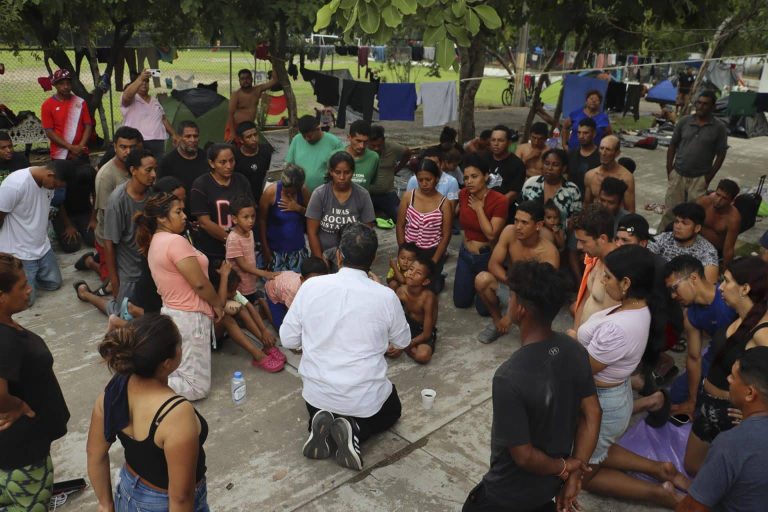4 de agosto 2024

Children of Exile: The Births “Sowing Hope” in the Camp of Nicaraguan Farmers

PUBLICIDAD 1M
PUBLICIDAD 4D
PUBLICIDAD 5D
Thousands of irregularities have been discovered in applications. Some 90,000 Nicaraguans have received parole so far, although not all have traveled

Migrants talk with a member of civil and human rights associations in Mexico. Photo: EFE/ Juan Manuel Blanco
The United States government has temporarily suspended the humanitarian parole program that benefits citizens of Nicaragua, Venezuela, Cuba, and Haiti, after detecting numerous suspected fraud cases in applications submitted by many sponsors, some of whom were reportedly behind the arrival of up to 30 people into US territory.
The program is suspended, not canceled, the United States Department of Homeland Security clarified to numerous media outlets in the country. To date, around 90,000 Nicaraguans have been approved for the program, although not all have traveled. “The pending ones are being reviewed three times, and no more applications are being accepted,” an expert source on immigration issues explained to CONFIDENCIAL.
The parole was launched in April 2022 as a way to regulate illegal immigration. Initially, it covered only citizens from Ukraine fleeing the large-scale invasion launched by Russia in February of that year. In October 2022, it was expanded to include Venezuela, and in January 2023, Cuba, Haiti, and Nicaragua were added.
The initiative limits the number of citizens from the four Latin American and Caribbean nations to whom authorization is offered to travel and enter the United States to 30,000 a month, provided they have a sponsor authorized by DHS. In addition to entry authorization, the program grants them a work permit valid for two years.
US authorities stipulate that those benefiting from the parole must enter the United States by air with a valid passport and expect that during that time, they will legalize their stay permanently through any available legal means, including asylum. If they do not achieve permanent residency by the end of the two years, they must leave the country.
People willing to serve as sponsors for someone wishing to apply for parole must be citizens, nationals, or legal permanent residents of the United States or have a legal status in the country, such as Temporary Protected Status or asylum. They must pass a background check and demonstrate sufficient financial resources to support and maintain their sponsors during the two years granted by the program.
[Editor’s Note: According to data from the United States Customs and Border Protection Office (CBP), “through the end of June 2024, 494,799 Cubans, Haitians, Nicaraguans, and Venezuelans arrived legally in the United States on commercial flights and were granted parole. Of these, 106,757 Cubans, 205,026 Haitians, 93,325 Nicaraguans, and 118,706 Venezuelans were investigated and authorized to travel; and 104,130 Cubans, 194,027 Haitians, 86,101 Nicaraguans, and 110,541 Venezuelans arrived legally and were granted parole.”]
Thousands of Irregularities Found with Parole in the United States
A report from the United States Citizenship and Immigration Services (USCIS), an agency of the Department of Homeland Security, uncovered large amounts of fraud in the applications of those sponsoring applicants.
The report analyzed 2.6 million applications, finding that many forms submitted for the program included false or incomplete Social Security numbers, addresses, and even phone numbers, which were used hundreds of times in some cases. It was detected that a sponsor’s phone number was used on more than 2000 forms submitted by 200 different sponsors.
Similarly, they also found that only 100 IP addresses collectively submitted 51,133 applications. One of them, located in Tijuana, Mexico, was used 1,328 times. An email address of a sponsor was used on 363 different forms.
Another finding was that almost 101,000 forms had been submitted by 3,218 sponsors; many of these often did not report their income, even though that is a determining requirement, or did not meet the financial threshold to support the number of people they intended to sponsor.
The report also highlights that applicants used Social Security numbers of deceased individuals, stating that “24 of the 1,000 most-used sponsor Social Security numbers belong to a deceased person.”
In coordination with the US Postal Service, it was discovered that 465 postal codes did not exist and were apparently used on 2,839 forms. It was also confirmed that 100 real physical addresses were used between 124 and 739 times on unique forms, totaling just over 19,000 forms. These addresses include mobile home parks, warehouses, apartment complexes, and commercial properties.
In light of all these findings, a DHS spokesperson said, “When fraud is identified, the United States Immigration and Customs Enforcement (ICE) will investigate and litigate applicable cases in immigration courts and make criminal referrals to the Department of Justice.”
This article was published in Spanish in Confidencial and translated by Havana Times. To get the most relevant news from our English coverage delivered straight to your inbox, subscribe to The Dispatch.
PUBLICIDAD 3M
Periodista nicaragüense, exiliado en Costa Rica. Durante más de veinte años se ha desempeñado en CONFIDENCIAL como periodista de Economía. Antes trabajó en el semanario La Crónica, el diario La Prensa y El Nuevo Diario. Además, ha publicado en el Diario de Hoy, de El Salvador. Ha ganado en dos ocasiones el Premio a la Excelencia en Periodismo Pedro Joaquín Chamorro Cardenal, en Nicaragua.
PUBLICIDAD 3D